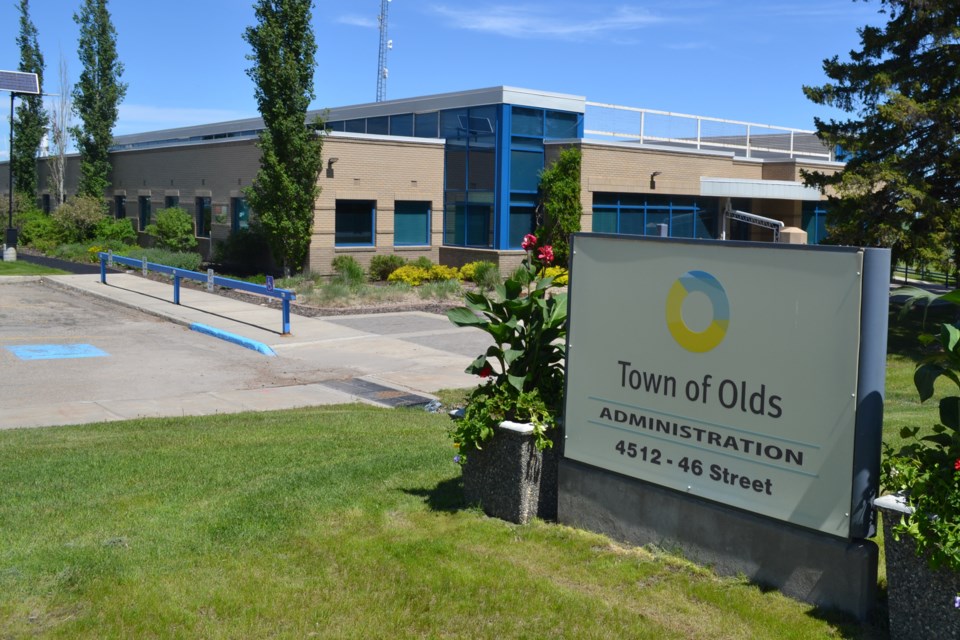OLDS – Town council has voted to have staff “revisit and reduce overall naturalized areas” after receiving negative feedback on the program from many citizens.
Council made that decision after a more than 30-minute discussion on the matter during its June 23 meeting.
Coun. Dan Daley called for some kind of public meeting to gain more feedback from citizens, but it was also suggested that feedback could be provided during another council meeting or during the next Coffee With Council, slated to occur July 10 at the farmer’s market.
Under naturalization, certain low-use or difficult-to-maintain green spaces and shrub beds are left to evolve into more “natural,” self-sustaining landscapes. Mowing in designated green spaces is stopped or done less frequently to allow native grasses and vegetation to grow naturally.
The move has been underway in Olds in some green spaces for a couple of months now.
Community services director Guy LaPointe opened the discussion with a presentation, noting the initial decision to go with naturalization was made back in September last year.
About 23 acres were expected to be naturalized. That’s expected to save about 13 working days of staff time a year at a time when the Town is squeezed financially and staff-wise.
A total of 31 Report A Problem (RAP) complaints about naturalization were submitted on the Town’s website when LaPointe’s presentation was drawn up.
Councllors also heard complaints during at least one Coffee With Council event and through email and phone correspondence.
Lapointe said 30 of the 31 RAP complaints received were in regard to four locations.
“Twelve of 17 locations have not received any direct feedback at this point. By academic standards, that's likely a B minus on our side of things, so not bad,” he said.
In the wake of the blowback from some in community, Lapointe’s presentation listed three options on naturalization for council to consider:
- Stay the course: allow the community to adjust and review feedback at the end of the season;
- Full stop: discontinue the whole program;
- Modification: revisit and reduce overall naturalized areas.
In the end, all councillors who spoke chose option 3. It was also suggested that an arrangement could be worked out with some residents who might be willing to mow green spaces in their areas.
Lapointe said as a result of the feedback staff plan to restart mowing at Sherwood Crescent.
He said administrative staff also recommend a policy whereby any green space within residential areas that is larger than three acres “should not be entirely naturalized.”
“Feedback indicates these sites serve as important community gathering spaces,” he said.
Flat areas could be mowed and smaller no-mow zones could be created around natural areas like tree groves or outcroppings.
Several councillors said Olds is not the only community utilizing naturalization; communities around the world are going that route.
The Town’s tight finances were mentioned, hence the need for some form of naturalization. However, LaPointe and chief administrative officer Brent Williams said a major impetus was to enable staff to be reassigned to other high priority needs.
Mayor Judy Dahl agreed with Coun. Wanda Blatz, who suggested going with option 3 in order to respond to residents’ concerns.
“I feel as mayor that we dropped the ball, my council (and) myself in being able to fully engage with ab lot of the community members in this regard,” she said, adding however, that she didn’t want to see the entire naturalization program discontinued.
Coun. Darren Wilson was among those who said it will take a while for naturalization to look better, but it’s needed in view of current fiscal challenges.
He agreed with Coun. Dan Daley that for some citizens, “green space becomes backyard and backyard becomes green space,” so the appearance of those green spaces really matters to them.
A few councillors, including Wilson, suggested possibly partnering with some residents to ensure certain green spaces are mowed and kept up. LaPointe said something like that is certainly possible.
Wlson said some residents suggested hiring more students to ensure the green spaces are kept groomed, but he said that’s just not feasible.
“The answer is sustainability,” he said.
Coun. James Cummings was among several councillors who said on the one hand, residents want “world class” amenities such as attractive green spaces, athletic parks and facilities but there’s a cost to that.
“We have a lot of pressure to reduce costs, reduce expenses. We can't keep reducing expenses, but add to the inventory of parks and playgrounds, the math doesn't work there at all,” he said.
Coun. Harvey Walsh said there’s a cost to naturalization. He wondered what that will be.
“When this was pitched to council, there was no cost put into it because we don't have those costs,” Williams said.
“But we're fully aware there's going to be costs of naturalization, but in our rollout of it and our liaising with those at Olds College with expertise in the area, year 1 essentially is no-mow program, and watching to see what the noxious weeds and nuisance leads look like.”



